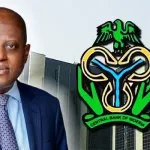The Central Bank of Nigeria has increased the benchmark interest rate by 150 basis points to 26.25 per cent.
This was the decision of the Monetary Policy Committee (MPC) of the CBN that held its 295th MPC meeting between Monday, 20 and Tuesday 21 May 2024 at CBN headquarters, Abuja.
Join our WhatsApp ChannelThis is the third time the CBN increased the Monetary Policy Rate (MPR) in three months. The bank had in February, hiked the MPR by 400 basis points from 18.75 per cent to 22.75 percent. Subsequently, the apex bank had after the March MPC meeting, increased the benchmark interest rate by 200 basis points to 24.75 per cent. This means the interest rate has been raised by a total of 7.5 per cent since the February meeting.
The committee, however, retained the asymmetric corridor around the MPR at +100/-300 basis points and left the Cash Reserve Ratio (CRR) of Deposit Money Banks, and the Liquidity Ratio unchanged at 45 per cent and 30 per cent respectively.
The MPC this time obviously, maintained its hawkish disposition since the advent of this current leadership of the CBN all in a bid to curb soaring inflation and achieve price stability.
The MPR is the rate at which commercial banks borrow from the CBN and often determines the cost of funds.
The headline inflation rate according to the latest data released by the National Bureau of Statistics (NBS), hit 33.69 per cent in April against the 33.20 recorded in March this year. The inflation rate which has been on an increase for the 18th straight month, is now 28 year high having recorded such a high rate last in 1996.
Cardoso, said that after an extensive review of the risks of inflation, the committee decided to continue with increasing the rate to rein in inflation and achieve price stability.
“Following an extensive review of risks and the near-term inflation outlook, the balance of risks suggests further tightening of policy to build on the benefits accruing from previous rate hikes,” the CBN governor said.
Cardoso further said members of the MPC noted that although headline inflation increased somewhat year on year in April 2024, headline, food, and core measures all decreased sharply in addition to month-on-month decline of both headline and food indexes in March 2024.
He claimed this indicated that the apex bank’s recent tight monetary policy stance was starting to have the expected effects, adding that the rate of price increases had now slowed.
The committee noted that food inflation, which is caused by growing farm produce transportation costs, infrastructure-related restrictions along the distribution network, security issues in some food-producing regions, and exchange rate pass-through to domestic prices for imported food items, continued to be the main source of inflationary pressure.
He said MPC recommended that more needs to be done to address the insecurity in farming communities to guarantee improved food production.
Reading the communique, Cardoso said that the MPC members also attributed the recent volatility in the foreign exchange market “to seasonal demand, a reflection of the interplay between demand and supply in a freely functioning market system.”
“The Committee also noted the marginal increase in the external reserve balance between March and April 2024 and urged the Bank to sustain its focus on accretion to reserves.”
He added that the MPC commended CBN for the recent approval of licenses of 14 International Money Transfer Operators (IMTOs), adding that it was expected to improve competition and lower the cost of transactions, and therefore attract more remittances through formal channels.
The CBN governor further stated that the Committee expressed satisfaction that the banking system remains stable despite the headwinds confronting the economy.
On banks’ recapitalisation, Cardoso said MPC also hailed the initiative and urged the apex bank management to sustain its regulatory oversight to ensure the continued stability of the banking system.
He said the next meeting of the Committee will hold on the 22nd and 23rd of July 2024.
Victor Ezeja is a passionate journalist with seven years of experience writing on economy, politics and energy. He holds a Master's degree in Mass Communication.


















Follow Us